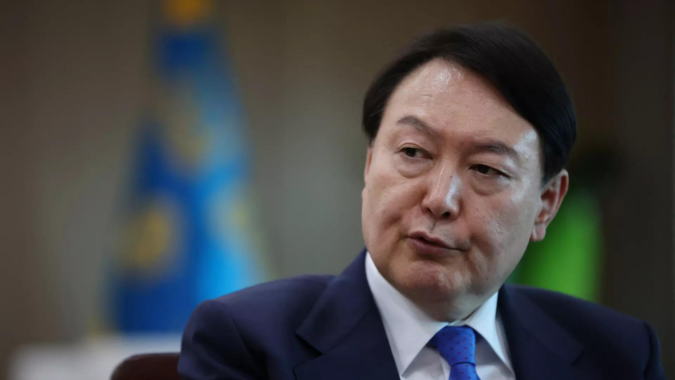SEOUL: South Korea‘s decision on whether to send military aid to Kyiv depends on Russia’s actions, Seoul‘s presidential office said Thursday, adding that a possible large-scale civilian attack could tip the balance.
Seoul has a long-standing policy against providing weapons to countries in active conflict, which it has repeatedly said makes it difficult to supply arms directly to Ukraine.
South Korea has supported the US-led sanctions on Moscow and has sent humanitarian aid to Kyiv, while signing major arms deals — including for tanks and howitzers — with Poland.
On Thursday, President Yoon Suk Yeol’s office said “South Korea could not just idly stand by and watch should there be killings that the international community takes seriously”.
“What happens next depends on Russia,” a presidential official told reporters on the condition of anonymity.
The official said that South Korea’s policy of not providing weapons to countries at war was not technically a law but a “voluntary” undertaking.
“Unless civilian deaths on a massive scale occur, our current position stands,” the official added.
Yoon told media this week that “if there is a situation the international community cannot condone, such as any large-scale attack on civilians… it might be difficult for us to insist only on humanitarian or financial support”.
This prompted Moscow to warn Seoul Wednesday over its “unfriendly stance,” saying the start of arms supplies would mean “a certain stage of involvement” in the Ukraine conflict.
South Korea is a key US ally and a major manufacturer of artillery ammunition.
One of the recently leaked US intelligence documents portray Seoul’s security officials as being torn between its existing policies on lethal aid to conflict zones, and increasing demands from the West to secure arms for Ukraine.
One South Korean official suggested exporting ammunition to Poland to get around the policy, the document showed.
Yoon is scheduled to travel to the United States next week on a state visit.
Seoul has a long-standing policy against providing weapons to countries in active conflict, which it has repeatedly said makes it difficult to supply arms directly to Ukraine.
South Korea has supported the US-led sanctions on Moscow and has sent humanitarian aid to Kyiv, while signing major arms deals — including for tanks and howitzers — with Poland.
On Thursday, President Yoon Suk Yeol’s office said “South Korea could not just idly stand by and watch should there be killings that the international community takes seriously”.
“What happens next depends on Russia,” a presidential official told reporters on the condition of anonymity.
The official said that South Korea’s policy of not providing weapons to countries at war was not technically a law but a “voluntary” undertaking.
“Unless civilian deaths on a massive scale occur, our current position stands,” the official added.
Yoon told media this week that “if there is a situation the international community cannot condone, such as any large-scale attack on civilians… it might be difficult for us to insist only on humanitarian or financial support”.
This prompted Moscow to warn Seoul Wednesday over its “unfriendly stance,” saying the start of arms supplies would mean “a certain stage of involvement” in the Ukraine conflict.
South Korea is a key US ally and a major manufacturer of artillery ammunition.
One of the recently leaked US intelligence documents portray Seoul’s security officials as being torn between its existing policies on lethal aid to conflict zones, and increasing demands from the West to secure arms for Ukraine.
One South Korean official suggested exporting ammunition to Poland to get around the policy, the document showed.
Yoon is scheduled to travel to the United States next week on a state visit.
